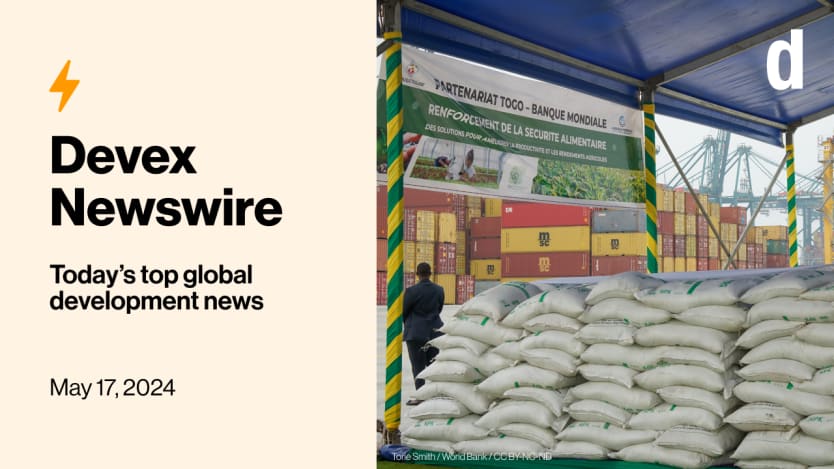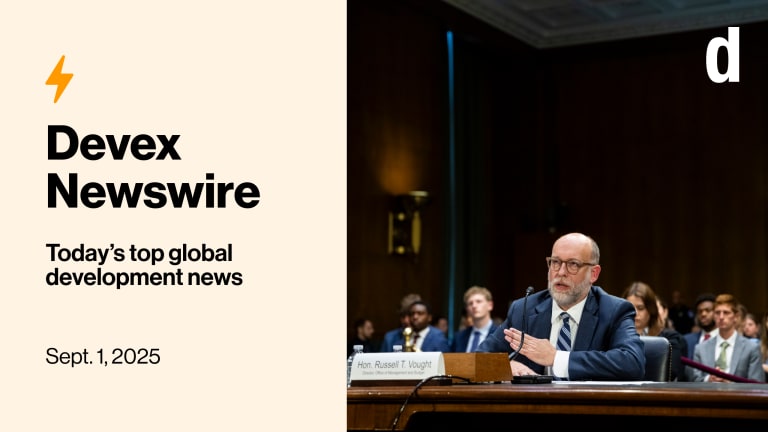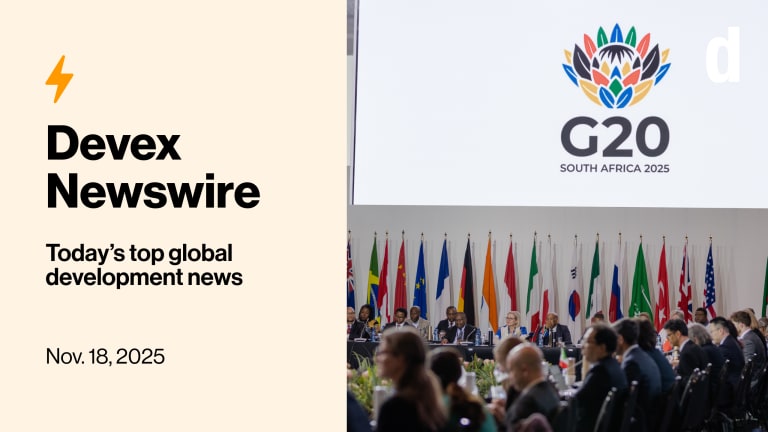
African leaders aim to bolster agriculture and soil health from the ground up, financing and increasing domestic fertilizer production. Urgency fueled by climate change underscores the critical need to address food insecurity.
This is a preview of Newswire
Sign up to this newsletter for an inside look at the biggest stories in global development, in your inbox daily.
Also in today’s edition: Will a Trump presidency impose an expanded global gag rule? Plus, the Gaza pier is almost ready, we look at the numbers behind the Bezos Earth Fund, and EDC gets a new look and strategy.
+ Devex World is making a return this year! Take advantage of our early-access pricing today and get your ticket at a reduced price to join us on Oct. 24 in Washington, D.C. and connect with leaders shaping the future of global development.
Fertilizer frenzy
African leaders have vowed to triple fertilizer use on the continent over the next decade — an attempt to save Africa’s soil by literally starting from the ground up.
The declaration was made last week at the African Fertilizer and Soil Health Summit, which gathered thousands of delegates to discuss soil, food security, and agriculture. By the end of the three-day event, Africa’s leaders had agreed to not just finance the plan, but to push for more fertilizer to be manufactured on the continent itself — to the tune of three times today’s domestic production.
If all goes well, the move is expected to enhance crop yields, reverse land degradation, and improve soil health. But at the same time, it follows similar commitments that have failed to bear fruit: Nearly two decades after the last such summit — where countries committed to boosting their fertilizer production — more than 40 African countries failed to achieve their targets.
But today, the threats of climate change loom larger than ever, Devex contributor Anthony Langat writes, making these new commitments — and the funding tied to them — even more critical. Over 140 million people face food insecurity on the continent, despite it containing some 60% of the world’s arable land.
Read: African leaders pledge to triple fertilizer use to improve soil quality
Gagged, to the tune of 8 million women
Eight million women lost access to sexual and reproductive services after the Trump administration expanded the global gag rule, a U.S. government policy that blocks foreign organizations from receiving any U.S. global health assistance if they provide abortion services, counseling, referrals, or advocacy, even if those activities are performed with the organization’s non-U.S. funds.
It’s a policy that’s typically initiated by Republican presidents and repealed by Democratic ones — and as the world gears up for another potential Trump presidency, many reproductive health experts warn we’ll see much of the same. If Trump wins in November, it’s possible he will expand the policy even further, including to all U.S. foreign assistance — not just global health funding — and block cash to multilaterals like the United Nations Population Fund, writes Devex Senior Reporter Jenny Lei Ravelo.
Read: The 'frightening' long-term impact of the global gag rule
+ Devex Pro members can dive deeper with our coverage on how a second Trump presidency could affect global aid:
• What MAGA has planned for USAID — and the world (Pro)
• What does the US general election mean for aid? (Pro)
Not yet a Devex Pro member? Start your 15-day free trial today to access all our exclusive reporting and analyses, invite-only events, the world’s largest global development job board, and more.
Bezos by the numbers
Back in 2020, Jeff Bezos, then the world's richest individual, took up the fight against climate change. With a $10 billion pledge, he launched the Bezos Earth Fund dedicated solely to tackling the climate crisis head-on.
The commitment has evolved into possibly the largest philanthropic organization working wholly on climate-related causes. With the latest commitment of $100 million for pioneering projects leveraging artificial intelligence to combat climate change, the fund hopes to meet its goal of disbursing the entire startup money by 2030, writes Devex Junior Development Analyst Alecsondra Kieren Si.
So far $1.7 billion has been deployed, with non-U.S. grants amounting to $1.1 billion. Alecsondra digs into the data to see where the grants are going and what kind of projects the fund has prioritized. The fund has seven main funding programs, ranging from environmental conservation to economics and finance.
Read: What's inside the $10B Bezos Earth Fund? (Pro)
+Listen: Tune in to the latest episode of our weekly podcast series as Devex’s Raj Kumar and David Ainsworth sit down with Sasha Fisher from Spark Microgrants to discuss this week's top philanthropy news, including where MacKenzie Scott has been spending her money and Melinda French Gates’ “next chapter.”
Pier lifeline
The U.S. has finished constructing a pier to get aid to Gaza — one that’s raised eyebrows from humanitarian agencies that say greater access via land routes is the most effective way to get aid into the territory.
USAID’s Dan Dieckhaus, the response director for the agency’s Levant humanitarian response, addressed the skepticism at a State Department press briefing.
“USAID is coordinating with the Department of Defense to establish a maritime corridor to augment — not replace, but to augment — ongoing efforts to scale the delivery of humanitarian aid by land,” Dieckhaus said.
The maritime corridor is expected to be operational in the coming days, the official explained, and commodities from the U.S. and other countries are now being unloaded in Cyprus. Once there, they’ll be screened and packed onto ships — and after arrival in Gaza, the World Food Programme and the U.N. will handle distribution inside Gaza.
Despite the massive investment, however, Dieckhaus recognized the concerns of many aid organizations working in Gaza: that the pier “in and of itself is insufficient” to address the staggering scale of need, my colleague Elissa Miolene tells me.
“It is always meant to be additive,” he said. “What we want to see is the full opening of all existing crossings and potentially the expansion of even more numbers of crossings.”
ICYMI: Aid groups doubt Biden's pier will solve Gaza's problems (Pro)
‘Learning from Mistakes’
The World Bank announced yesterday that it will be launching an independent review to verify that its internal watchdog's investigation into the International Finance Corporation's $13.5 million investment in Bridge International Academies was conducted without interference.
The investigation, carried out by the Compliance Advisor Ombudsman, accused IFC — the bank’s private-sector arm — of multiple failings, including that staff turned a blind eye to reports of sexual abuse at the for-profit chain of schools and then later interfered with the CAO investigation.
In an email sent to staff in March, titled “Learning from Mistakes,” World Bank Group President Ajay Banga apologized for the “trauma” experienced by children sexually abused at schools in Kenya, admitted failings at IFC, and promised an independent investigation by an outside party.
The probe is meant to ensure that the CAO had full access to necessary documents and information for the investigation and confirm that IFC staff and management cooperated fully.
ICYMI: World Bank's Banga apologizes to kids sexually abused at Bridge schools
Related: IFC slammed by its own watchdog for ignoring child sex abuse allegations
EDC's transformation
EDC, a pioneering force in global education, is transforming, unveiling a new strategy, identity, and ethos. With roots tracing back to 1958, when visionary physicists from the Massachusetts Institute of Technology founded the organization out of concern for the state of science education in the U.S., EDC has evolved to address the world's most pressing challenges.
Now, the NGO, with $200.7 million revenue in 2023 and a staff of around 1,400, half of which work on international programs and half in the U.S., is changing again to meet “today’s interconnected challenges which need interconnected solutions,” Siobhan Murphy, EDC’s interim president and CEO, tells Devex contributor Sophie Edwards.
This involves ensuring equitable access to quality education and care, fostering “green skills” to thrive in a rapidly evolving world, empowering educators to meet the diverse needs of learners, and prioritizing well-being through safe environments and comprehensive health care.
Read: Education nonprofit to expand focus to climate and green jobs
In other news
Vietnam has lost at least $2.5 billion in foreign aid over the past three years and could forfeit another $1 billion due to an anti-graft freeze, according to an unpublished document. [Reuters]
A major environmental group won a lawsuit requiring the German government to improve its climate protection plan after a court found it insufficient to meet national climate goals. [DW]
Fifteen EU states have called for tighter rules on the bloc's recently adopted asylum pact, such as easier transfers of undocumented migrants to third countries, including those rescued at sea. [VOA]
Sign up to Newswire for an inside look at the biggest stories in global development.








